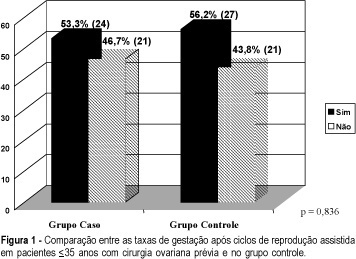Revista Brasileira de Ginecologia e Obstetrícia. 2002;24(6):371-376

Purpose: to evaluate the effect of previous ovarian surgery for endometriosis on the ovarian response in assisted reproduction treatment cycles and its pregnancy outcome. Methods: a total of 61 women, with primary infertility and previous ovarian surgery for endometriosis, submitted to 74 in vitro fertilization/intracytoplasmic spermatozoid injection (IVF/ICSI) cycles, were studied (study group). A further 74 patients with primary infertility who underwent 77 IVF/ICSI cycles within the same period of time, at the same clinic and without previous ovarian surgery or endometriosis were studied as control group. Patients were matched for age and performed treatment. The groups were compared regarding number of ampoules used for superovulation, duration of folliculogenesis, number of follicles, number of oocytes, fertilization and pregnancy rate. IVF started with long protocol GnRHa for pituitary suppression followed by superovulation. After oocyte collection, in vitro insemination or sperm injection was performed and embryos were transferred from day 2 to day 5. Results: patients <35 years with previous ovarian surgery had less oocytes retrieved than the patients of the control group (p=0.049). Number of ampoules used for superovulation, duration of folliculogenesis, number of follicles, and fertilization rate were similar in both groups. The same was observed for pregnancy rates, as 24 patients (53.3%) with previous ovarian surgery and 27 (56.2%) of the control group became pregnant. Patients >35 years with previous ovarian surgery needed more ampoules for superovulation (p=0.017) and had less follicles and oocytes than women of the control group (p=0.001). Duration of folliculogenesis was similar in both groups, as was fertilization rate. A total of 10 patients achieved pregnancy in the study group (34.5%) and 14 (48.3%) in the control group. Conclusion: ovarian surgery for endometriosis reduced the ovarian outcome in IVF/ICSI cycles in women >35 years old, and might also decrease pregnancy rates. Therefore, we believe that for infertile patients, a conservative treatment might be a better option to avoid the reduction of ovarian response.
Search
Search in:


Comments